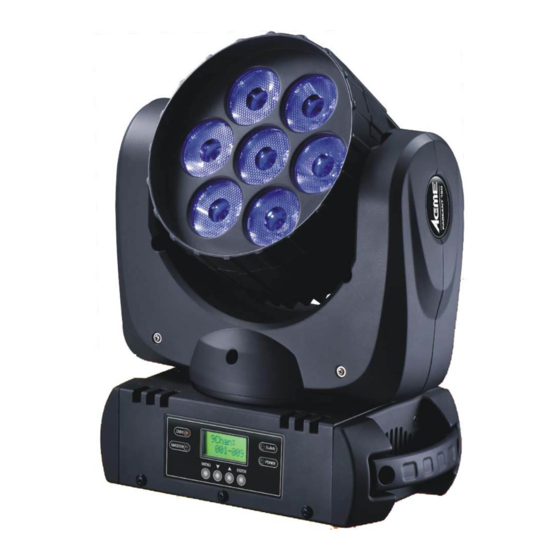
Table of Contents
Advertisement
Advertisement
Table of Contents

Summary of Contents for ACME CM-150 PAGEANT 150
- Page 1 PAGEANT 150 CM-150 User Guide Professional Entertainment Technology...
-
Page 2: Table Of Contents
CONTENTS 1. Safety Instruction......................2 2. Technical Specification .....................3 3. How To Set The Unit....................4 3.1 Control panel ......................4 3.2 Main Function ......................4 3.3 Home Position Adjustment ...................10 4. How To Control The Unit..................11 4.1 Master/Slave Built In Preprogrammed Function ........... 11 4.2 Easy Controller ..................... -
Page 3: Safety Instruction
1. Safety Instruction Please read carefully this instruction, which includes important information about the installation, usage and maintenance. WARNING Please keep this User Guide for future consultation. If you sell the unit to another user, be sure that they also receive this instruction booklet. Unpack and check carefully there is no transportation damage before using the unit. -
Page 4: Technical Specification
Caution: There are no user serviceable parts inside the unit. Do not open the housing or attempt any repairs yourself. In the unlikely event your unit may require service, please contact your nearest dealer. Installation: The unit should be mounted via its screw holes on the bracket. Always ensure that the unit is firmly fixed to avoid vibration and slipping while operating. -
Page 5: How To Set The Unit
3. How To Set The Unit 3.1 Control panel Display: To show the various menus and the selected functions LED: DMX input present Master Mode MASTER Slave Mode SLAVE Flashing Sound activation SOUND Button: To select the programming functions MENU To go backward in the selected functions DOWN To go forward in the selected functions... - Page 7 DMX Address Select DMX Address, press the ENTER button to confirm, the present address will blink on the display. Use the UP and DOWN button to adjust the address from 1 to 512. Once the address has been selected, press the ENTER button to setup, to go back to the functions without any change press the MENU button again.
- Page 8 Mode 1(Optically Linear): The increase in light intensity appears to be linear as DMX value is increased. Mode 2(Square Law): Light intensity control is finer at low levels and coarser at high levels. Mode 3(Inverse Square Law): Light intensity control is coarser at low levels and finger at high levels. Mode 4(S-cure): Light intensity control is finger at low levels and high levels and coarser at medium levels.
- Page 9 the menu mode. Sound Sense Select Sound Sense, press the ENTER button to confirm, present mode will blink on the display. Use the DOWN and UP button to change the sound sense from 0 …100. Once the mode has been selected, press the ENTER button to setup, to go back to the functions without any change press the MENU button again.
- Page 10 Functions of 9/16/28CH are activated/deactivated) mode. Once the mode has been selected, press the ENTER button to setup, to go back to the functions without any change press the MENU button again. Hold and press the MENU button about one second or wait for one minute to exit the menu mode. White Balance Select White Balance, press the ENTER button to confirm, present mode will blink on the display.
-
Page 11: Home Position Adjustment
Fixture Time Press the MENU button up to when the Fixture Time is blinking on the display. Pressing ENTER button and the display will show the number of working hours of the unit. To go back to the functions press the MENU button again. -
Page 12: How To Control The Unit
menu mode. 4. How To Control The Unit You can operate the unit in three ways: 1. Master/slave built-in preprogram function 2. Easy controller 3. Universal DMX controller No need to turn the unit off when you change the DMX address, as new DMX address setting will be effect at once. -
Page 13: Dmx Controller
Stand By Blackout the unit Function 1. Sync. Strobe Show 1. Pan index Fade Speed 2. Async strobe 2. Tilt index 1. Fast 3. Sound Strobe 3. Dimmer 2. Middle 3. Slow Mode Sound Show Show LED ON (LED OFF) (LED Slow (LED Fast Blinking) -
Page 14: Dmx 512 Configuration
4.4 DMX 512 Configuration 1 channel mode: 9 channels Mode:... - Page 15 12 channels mode:...
- Page 16 14 channels mode:...
- Page 17 16 channels mode:...
- Page 18 28 channels mode:...
-
Page 20: Dmx512 Connection
4.5 DMX512 Connection 1. If you using a controller with 5 pins DMX output, you need to use a 5 to 3 pin adapter-cable. 2. At last unit, the DMX cable has to be terminated with a terminator. Solder a 120 ohm 1/4W resistor between pin 2(DMX-) and pin 3(DMX+) into a 3-pin XLR-plug and plug it in the DMX-output of the last unit. -
Page 21: Troubleshooting
5. Troubleshooting Following are a few common problems that may occur during operation. Here are some suggestions for easy troubleshooting: A. The unit does not work, no light and the fan does not work 1. Check the connection of power and main fuse. 2. -
Page 22: Fixture Cleaning
6. Fixture Cleaning The cleaning of internal and external optical lenses and/or mirrors must be carried out periodically to optimize light output. Cleaning frequency depends on the environment in which the fixture operates: damp, smoky or particularly dirty surrounding can cause greater accumulation of dirt on the unit’s optics. Clean with soft cloth using normal glass cleaning fluid. - Page 23 Declaration of Conformity We declare that our products (lighting equipments) comply with the following specification and bears CE mark in accordance with the provision of the Electromagnetic Compatibility (EMC) Directive 89/336/EEC. EN55103-1: 2009 ; EN55103-2: 2009; EN62471: 2008; EN61000-3-2: 2006 + A1:2009 + A2:2009; EN61000-3-3: 2008. &...
- Page 24 Innovation, Quality, Performance...














Need help?
Do you have a question about the CM-150 PAGEANT 150 and is the answer not in the manual?
Questions and answers